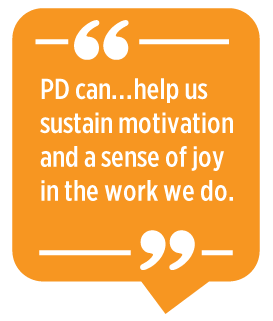ADVERTISEMENT
September 2023
Question: "How can PD be helpful in improving the teaching and learning process?"
In my view, the primary goals of professional development [PD] are to promote professional learning, create a community of practice, and, ultimately, enhance learning outcomes for students and programs. PD can provide educators with new techniques, strategies, and evidence-based practices to elevate the teaching and learning experience. PD can also create conditions that support educators holistically on social and emotional levels, which is important because—arguably—a well-balanced, fulfilled educator has greater capacity for engaging learners through meaningful instructional practices.
Among TESOL’s 6 Principles for Exemplary Teaching of English Learners®, Principle 6 is “Engage and collaborate within a community of practice” (CoP). For me, community is a driving force in my life, both personally and professionally, so I seek out opportunities to learn with and from others. As humans, we’re not meant to live and work in isolation, so we inherently seek out relationships that enhance our lives.

In many ways, PD can provide us with the personal and professional connections that help us sustain motivation and a sense of joy in the work we do, which extends to the students we share learning spaces with. A CoP can provide the socioemotional support that fuels us when we’re feeling isolated, frustrated, or simply burned out. Of the PD options that foster deeper connections, some of my favorites include study circles, lesson study, peer coaching, and collaborative sessions at conferences (e.g., workshops, discussions, and poster sessions).
Study circles (my top choice for teacher-led, inquiry-based PD) are great because they intentionally infuse research into the professional learning experience so that participants can connect their day-to-day practices with scholarly work in their respective fields. The research can be explored in a format that resembles a book club; individuals can take turns leading discussions on articles of their choosing; or, sessions can be more structured (e.g., see this study circle facilitator’s guide from the National Center for Adult Learning and Literacy).
I have to sing the praises of our colleagues in Minnesota, USA at ATLAS ABE and Hamline University who have created several study circle facilitator guides that anyone can download and use (see guides linked at the end of this column). They provide all the resources you need to explore various topics within adult education. As with any form of PD, you’ll want to adapt the materials to fit the teaching and learning context and the needs of the participants, which may mean finding different research articles to read or adapting certain activities in response to available resources. But don’t try to re-create the wheel—adapt what these amazing colleagues of ours have already created!
PD—whether it be in community or an independent endeavor such as an asynchronous online course or webinar—broadens our skill set as educators and administrators so that we teach, lead, and mentor using evidence-based, high-impact practices. In our CoPs, we can find inspiration from one another. We can debrief failures and explore “blue sky” ideas. We can gain confidence from the validation and feedback of our peers. And if we’re fortunate, our colleagues become more than collaborators—they become friends!
Study Circles from ATLAS ABE & Hamline University
Do you have a question for the TESOL leadership? Email your question to tc@tesol.org with the subject line “Ask a TESOL Leader” and it could be featured in this column!
|
Download this column (PDF) |
Do you have a question for the TESOL leadership? Email your question to tc@tesol.org with the subject line "Ask a TESOL Leader" and it could be featured in this column!
Raichle Farrelly is an associate teaching professor and director of the TESOL Program at the University of Colorado Boulder. She offers courses on principles and practices in TESOL, teaching L2 oral skills, pedagogical grammar, and introduction to linguistics. Farrelly coedited Educating Refugee-background Students: Critical Issues and Dynamic Contexts, the Handbook of Research on Cultivating Literacy in Diverse and Multilingual Classrooms, and Continuing Professional Development of TESOL Professionals: A Global Landscape.
| Next Article |
Open Rank Faculty Position in Translation and Interpreting; The Chinese University of Hong Kong, Shenzhen, Guangdong, China
Open Rank Faculty Position in English Studies Programme; The Chinese University of Hong Kong, Shenzhen, Guangdong, China
Open Rank Faculty Position in English Language; The Chinese University of Hong Kong, Shenzhen, Guangdong, China
English Language Instructor Position; Southern University of Science and Technology, Shenzhen, Guangdong, China
To browse all of TESOL's job postings, check out the TESOL Career Center.
12 September 2023
School-Wide English Learning (SWEL) Workshop Series
15 September 2023 (Deadline)
Call for TESOL Award Applications
16 September 2023
TESOL Live! Connect Around the World
27 September 2023
TESOL Training for Trainers Course
24–25 October 2023
TESOL ELevate
TESOL
Worldwide Calendar of Events
Find conferences and events related to the field of English language education